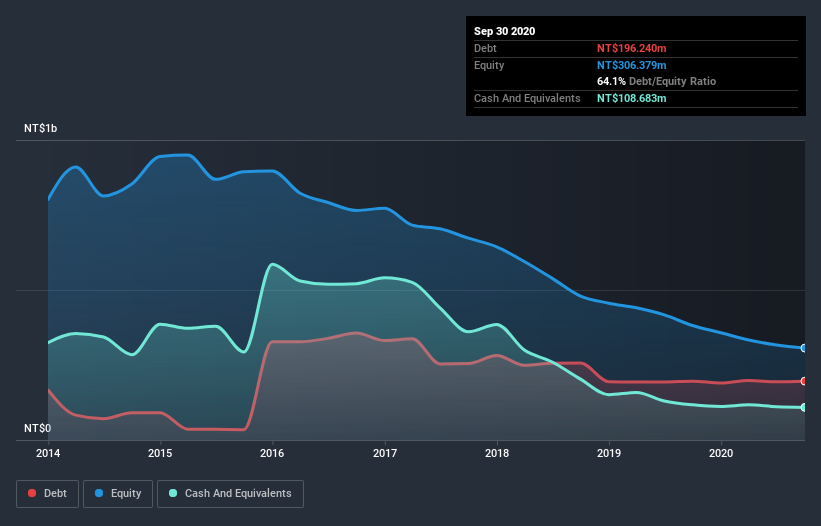Does Cayman Tung Ling (GTSM:2924) Have A Healthy Balance Sheet?
The external fund manager backed by Berkshire Hathaway's Charlie Munger, Li Lu, makes no bones about it when he says 'The biggest investment risk is not the volatility of prices, but whether you will suffer a permanent loss of capital.' So it might be obvious that you need to consider debt, when you think about how risky any given stock is, because too much debt can sink a company. We note that Cayman Tung Ling Co., Limited (GTSM:2924) does have debt on its balance sheet. But the real question is whether this debt is making the company risky.
What Risk Does Debt Bring?
Generally speaking, debt only becomes a real problem when a company can't easily pay it off, either by raising capital or with its own cash flow. In the worst case scenario, a company can go bankrupt if it cannot pay its creditors. While that is not too common, we often do see indebted companies permanently diluting shareholders because lenders force them to raise capital at a distressed price. Having said that, the most common situation is where a company manages its debt reasonably well - and to its own advantage. The first step when considering a company's debt levels is to consider its cash and debt together.
Check out our latest analysis for Cayman Tung Ling
What Is Cayman Tung Ling's Debt?
The chart below, which you can click on for greater detail, shows that Cayman Tung Ling had NT$196.2m in debt in September 2020; about the same as the year before. On the flip side, it has NT$108.7m in cash leading to net debt of about NT$87.6m.

How Healthy Is Cayman Tung Ling's Balance Sheet?
According to the last reported balance sheet, Cayman Tung Ling had liabilities of NT$288.0m due within 12 months, and liabilities of NT$11.9m due beyond 12 months. On the other hand, it had cash of NT$108.7m and NT$52.6m worth of receivables due within a year. So its liabilities outweigh the sum of its cash and (near-term) receivables by NT$138.6m.
Of course, Cayman Tung Ling has a market capitalization of NT$774.2m, so these liabilities are probably manageable. However, we do think it is worth keeping an eye on its balance sheet strength, as it may change over time. When analysing debt levels, the balance sheet is the obvious place to start. But you can't view debt in total isolation; since Cayman Tung Ling will need earnings to service that debt. So when considering debt, it's definitely worth looking at the earnings trend. Click here for an interactive snapshot.
Over 12 months, Cayman Tung Ling made a loss at the EBIT level, and saw its revenue drop to NT$406m, which is a fall of 30%. That makes us nervous, to say the least.
Caveat Emptor
While Cayman Tung Ling's falling revenue is about as heartwarming as a wet blanket, arguably its earnings before interest and tax (EBIT) loss is even less appealing. Indeed, it lost NT$70m at the EBIT level. Considering that alongside the liabilities mentioned above does not give us much confidence that company should be using so much debt. Quite frankly we think the balance sheet is far from match-fit, although it could be improved with time. For example, we would not want to see a repeat of last year's loss of NT$65m. So to be blunt we do think it is risky. The balance sheet is clearly the area to focus on when you are analysing debt. But ultimately, every company can contain risks that exist outside of the balance sheet. For example, we've discovered 2 warning signs for Cayman Tung Ling (1 doesn't sit too well with us!) that you should be aware of before investing here.
At the end of the day, it's often better to focus on companies that are free from net debt. You can access our special list of such companies (all with a track record of profit growth). It's free.
If you decide to trade Cayman Tung Ling, use the lowest-cost* platform that is rated #1 Overall by Barron’s, Interactive Brokers. Trade stocks, options, futures, forex, bonds and funds on 135 markets, all from a single integrated account. Promoted
New: AI Stock Screener & Alerts
Our new AI Stock Screener scans the market every day to uncover opportunities.
• Dividend Powerhouses (3%+ Yield)
• Undervalued Small Caps with Insider Buying
• High growth Tech and AI Companies
Or build your own from over 50 metrics.
This article by Simply Wall St is general in nature. It does not constitute a recommendation to buy or sell any stock, and does not take account of your objectives, or your financial situation. We aim to bring you long-term focused analysis driven by fundamental data. Note that our analysis may not factor in the latest price-sensitive company announcements or qualitative material. Simply Wall St has no position in any stocks mentioned.
*Interactive Brokers Rated Lowest Cost Broker by StockBrokers.com Annual Online Review 2020
Have feedback on this article? Concerned about the content? Get in touch with us directly. Alternatively, email editorial-team (at) simplywallst.com.
About TPEX:2924
Cayman Island Grand Galactica
Researches, develops, manufactures, and sells various baby clothing and supplies in Taiwan and internationally.
Flawless balance sheet with low risk.
Similar Companies
Market Insights
Community Narratives



